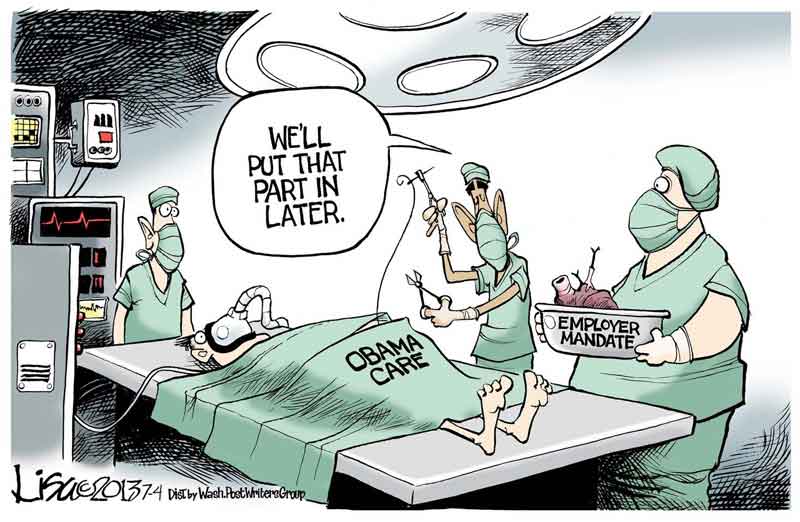The Obama administration’s decision to postpone a significant part of the Affordable Care Act doesn’t mean the law is collapsing, as its opponents have proclaimed.
Many important provisions already are in place, and more are on schedule to be phased in this year.
The announcement that enforcement of the employer mandate will be pushed back a year, until 2015, however, does indicate how complex a job it is to get the law into place, especially in the face of determined opposition from Republicans in Congress and state legislatures.
It also reflects the administration’s willingness to accommodate the business sector — a stance with its limits. The law is a series of interlocking parts, and an olive branch extended here may create a hole elsewhere.
The employer mandate holds that businesses with 50 or more full-time employees must provide affordable health insurance to workers or pay a penalty.
In a nation where 96 percent of businesses have fewer than 50 employees, the range of the law is actually quite limited. Plus, almost 95 percent of businesses with 50 or more employees already provide health coverage, by some estimates.
Business groups, however, have chaffed at the employer mandate, especially a provision that deems employees who work 30 hours or more a week to be considered full time.
Some businesses set a threshold higher than 30 hours a week for health benefits. Some were threatening to drop work weeks below 20 hours to avoid the mandate.
The reporting requirements and tax implications created by the employer mandate are complex. Unfortunately, Republicans in Congress have balked at giving the administration enough money to properly educate businesses about the law.
The decision to delay thrilled business groups, and a one-year delay shouldn’t adversely affect the rollout of the rest of the law.
In a more functional political environment, Congress would use the extra time to find a better way of determining which employees are eligible for health benefits than an arbitrary 30-hour-a-week limit.
That’s unlikely to happen, though, when one political party is determined to thwart the health care law, not fix it. It was hard to escape the irony last week while watching House Republicans, who have been unable to agree on a renewal of the farm bill, almost unanimously harangue the administration for its failure to roll out the Affordable Care Act precisely on schedule.
Without a fix, business groups aren’t any more likely to embrace the employer mandate a year from now.
And last week’s postponement isn’t the first concession the White House has made to businesses in the implementation of the Affordable Care Act. At some point, both the administration and businesses are going to have to bite the bullet and get the job done.
The law was designed to end gaps and inequities in health coverage, which have left millions of Americans unable to obtain the care they need. It already has had a great impact.
Insurers can no longer set lifetime limits. The “doughnut” hole in prescription drug coverage for seniors is gone. Insurers must spend 85 percent of what they receive in premiums on patient care. Young adults can remain on their parents’ insurance plans until age 26.
Doctors and hospitals are beginning to practice medicine in more cost-effective, high-quality ways. And starting next year, insurers cannot deny coverage based on pre-existing conditions.
But the trickiest and most important aspects of the law still must be put into place, and the process won’t work unless businesses do their share. Obama and others have worked too hard on health care reform to go wobbly now.
Editorial by The Kansas City Star
Send questions/comments to the editors.



Success. Please wait for the page to reload. If the page does not reload within 5 seconds, please refresh the page.
Enter your email and password to access comments.
Hi, to comment on stories you must . This profile is in addition to your subscription and website login.
Already have a commenting profile? .
Invalid username/password.
Please check your email to confirm and complete your registration.
Only subscribers are eligible to post comments. Please subscribe or login first for digital access. Here’s why.
Use the form below to reset your password. When you've submitted your account email, we will send an email with a reset code.